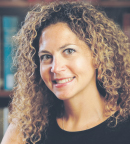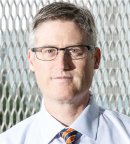Although thyroid cancer is among the five most common carcinomas diagnosed in adolescents and young adults (AYAs) between the ages of 15 and 39—thyroid cancer is more common in young women than young men and is the most common cancer diagnosed in females between the ages of 15 and 29 and the second most common cancer after breast cancer in females between the ages of 30 and 391—little research has been done to understand the unmet support care needs and survivorship concerns of these patients.

Melanie Goldfarb, MD, MSc, FACS, FACE
A study by Melanie Goldfarb, MD, MSc, FACS, FACE, comparing how AYAs and patients older than age 40 rated the medical and survivorship care information they received after their diagnosis, found that although both age groups were dissatisfied with the amount of attention paid to their survivorship needs, AYAs reported receiving less information on disease recurrence, long-term treatment side effects, support groups, coping strategies, and concerns about their overall emotional/psychological well-being than the older patients.2
The reason AYAs with thyroid cancer often receive less attention for their survivorship care needs is likely due to the fact that most of these patients are treated by an endocrinologist or endocrine surgeon who practices outside large academic cancer centers, where survivorship programs to alleviate the physical and emotional distress AYAs may feel following treatment are commonly accessible, according to Dr. Goldfarb.
“Thyroid cancer is a surgical disease, and, therefore, it is not usually treated by an oncologist, which is a good thing,” said Dr. Goldfarb, Director of the Endocrine Tumor Program at the John Wayne Cancer Institute and Providence Saint John’s Health Center in Santa Monica, California. “The downside is the cancer is usually not part of the routine survivorship care program available at most cancer centers. Endocrinologists and surgeons are well trained in treating thyroid cancer, but few have received training in survivorship care. We need the oncology community to reach out to the endocrinology community, so we can better serve all thyroid cancer survivors.”
The ASCO Post talked with Dr. Goldfarb about the rise in thyroid cancer in the AYA population; treatment for the disease; and the survivorship issues AYAs with this cancer face.
A Common Cancer
Thyroid cancer is one of the most common cancers in the AYA age group, especially among young women, and its incidence has been rising over the past 3 decades. Why is the cancer so common in this population, particularly in women?
About 70,000 people in this age group are diagnosed with cancer each year, accounting for about 5% of cancer diagnoses in the United States. So although thyroid cancer is among the most common cancers diagnosed in AYAs, it is still a relatively rare occurrence. Why the disease is more common in young women than men is unclear, but it is likely hormone related, because the discrepancy in incidence is apparent after puberty. Before puberty, the incidence of thyroid cancer is about equal in boys and girls, but after puberty, it is more common in females.
“Why the disease is more common in young women than men is unclear, but it is likely hormone related, because the discrepancy in incidence is apparent after puberty.”— Melanie Goldfarb, MD, MSc, FACS, FACE
Tweet this quote
A lot of studies have shown that thyroid cancer is increasing in this age group and in the general population, and there is a lot of speculation about whether this is a real increase or we are just detecting more of this cancer because of better screening and imaging techniques; and it looks like it is probably both. Thyroid cancer is definitely increasing, but we don’t know why.
Treating Thyroid Cancer
Thyroid cancer is usually treated by an endocrinologist or an endocrine surgeon and not an oncologist. Why is that?
The cancer is mainly a surgical disease and usually treated by an endocrine surgeon, who performs a thyroidectomy to remove either half or the entire thyroid gland. In some cases, the cancer is treated with adjuvant radioactive iodine, which is administered by an endocrinologist or a nuclear medicine specialist. Patients do not need chemotherapy, so it is not necessary for patients to see an oncologist, which is a good thing.

Brandon Hayes-Lattin, MD, FACP
Rarely, patients will have aggressive cancer that is not responding to standard treatment, and it will be for them to be treated by an oncologist, but that happens in less than 5% of all thyroid patients with thyroid cancer.
However, patients often have some of the same body image concerns and anxiety as other cancer survivors and commonly experience fatigue. However, because thyroid cancer is generally treated outside the cancer community environment, survivorship care resources and support programs are not readily available to these patients, and their psychosocial needs often go unmet.
GUEST EDITOR
Adolescent and Young Adult Oncology explores the unique physical, psychosocial, social, emotional, sexual, and financial challenges adolescents and young adults with cancer face. The column is guest edited by Brandon Hayes-Lattin, MD, FACP, Professor of Medicine and Medical Director of the Adolescent and Young Adult Oncology Program at the Knight Cancer Institute at Oregon Health and Science University in Portland, Oregon.I would like to see survivors of thyroid cancer be given access to the same survivorship programs survivors of other cancers receive. In some major cancer centers, endocrinologists and endocrine surgeons are part of the medical care team, and their patients do have access to the same survivorship programs and services as other cancer survivors, but that is rare. Instead, patients with thyroid cancer have to rely on organizations such as ThyCa: Thyroid Cancer Survivors’ Association (http://thyca.org) and local support groups to find resources for their cancer.
A Curable Disease
Is thyroid cancer in AYAs usually cured?
Yes. Most patients do well with treatment, and it is rare for them to die of this disease. However, the disease does recur in between 5% and 20% of patients, so patients have to be closely monitored every 3 to 6 months for the first 2 years after their diagnosis and then once a year if they are at low risk for recurrence.
411 ON THYROID CANCER IN YOUNG ADULTS
- It tends to be more common in young women than in young men.
- This is a surgical disease and usually not treated by an oncologist.
- The disease recurs in between 5% and 20% of patients.
- Better access to survivorship programs are needed.
Survivorship Concerns
What are the survivorship concerns of AYA thyroid cancer survivors?
Many are the same concerns other young cancer survivors have. Although thyroid cancer is usually curable and survivors usually do not have to worry about dying of their disease, they have to confront the fact that they had cancer and that it could recur. Once the thyroid gland is removed, survivors have to remember to take a daily thyroid hormone replacement pill to maintain their body’s normal metabolism and may experience fatigue until the dose of the medication is adjusted to the individual patient’s physical needs.
They may experience body image issues from having a visible surgical scar several inches long across the front of their neck from the thyroidectomy and may develop a temporary voice change, such as mild hoarseness, voice tiring, and weakness, as a result of the surgery, which can last for more than 6 months. In very rare instances—about 1%—complications from surgery can result in permanent damage to the laryngeal nerve, causing patients to lose their voice entirely.
As with many other AYA cancer survivors, there are the issues of dating and when to tell a prospective partner about the cancer. So these survivors are coping with many of the same psychosocial issues as other young cancer survivors, but, unfortunately, they usually don’t have the same survivorship care support system.
I would like to see oncologists and other professionals in the oncology field reach out to endocrinologists and endocrine surgeons in their local hospitals and other health-care facilities to help these subspecialists provide access to the same survivorship care programs and referrals to psychosocial services to their patients with thyroid cancer as other patients with cancer have. We need to improve the quality of health care for all patients with cancer, not just those treated in cancer centers. ■
DISCLOSURE: Dr. Goldfarb reported no conflicts of interest.
REFERENCES
1. Goldfarb M, Freyer DR: Comparison of secondary and primary thyroid cancer in adolescents and young adults. Cancer 120:1155-1161, 2014.
2. Goldfarb M, Casillas J: Unmet information and support needs in newly diagnosed thyroid cancer. J Cancer Surviv 8:394-401, 2014.

